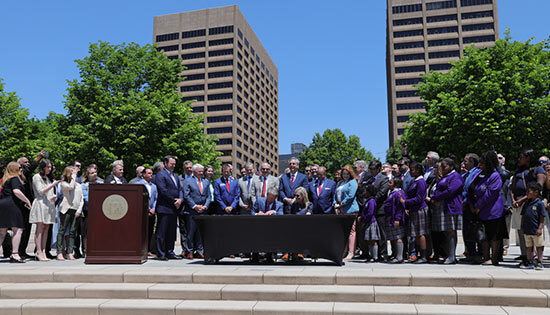
ATLANTA — In his farewell message, George Washington counseled against political parties, even as they formed around him.
Benjamin Disraeli praised party machinery as a means of reining in power-crazed or corrupt leaders, but in the next breath he confessed that they have “a tendency to warp the intelligence.”
Vladimir Lenin, of course, believed that a party of disciplined true believers could serve as the vanguard of revolution. And for a while, he was right.
The argument is now in its third century, and the time has come for the Georgia GOP to plunk down its two cents on the matter. After a highly successful election year that reinforced Georgia’s status as a one-party stronghold, Republicans statewide are about to be asked whether their GOP is:
a) A vast mechanism for raising cash and votes under a general banner of conservatism that leaves the details to elected leaders, or
b) An active, ideological police force that calls out Republican politicians who stray on taxes, free enterprise and other pillars of principle identified by grass-roots activists.
This midlife identity crisis comes at what may be the zenith of Republican influence in the state, courtesy of a race for state GOP chairman. The contest won’t be settled until delegates gather next month in Athens.
Incumbent John Padgett, the owner of an ambulance company, is seeking re-election to a two-year term. He faces Alex Johnson, a 30-year-old DeKalb County attorney with libertarian leanings. It is something of a rematch.
In a final ballot at the 2013 convention, the young Johnson surprised many by receiving 40 percent of the vote — this at a gathering of delegates whose average age is somewhere south of the Mesozoic Era.
Regardless of outcome, the mid-May election will serve as a measure of tea party fury as the movement, ever suspicious of incumbency, enters its seventh year.
The following lines are from a note Johnson recently sent to supporters:
“While you have worked hard for the party and your principles to ensure Republican victories, the state party has remained silent and supportive as some so-called ‘Republican’ politicians betray your basic core principles and destroy our brand.”
Johnson rattled off a series of alleged betrayals: The tax increase contained in a $900 million-a-year transportation funding bill passed by the General Assembly. Another measure to “maintain taxicab monopolies” by imposing insurance requirements on Internet-based, ride-hiring services such as Uber and Lyft. The decisions by newly elected GOP Congressmen Barry Loudermilk and Jody Hice to vote for John Boehner as U.S. House speaker.
Johnson has also faulted the state GOP for failing to condemn John Barge, the exiting Republican state school superintendent, when last year he endorsed Democrat Valarie Wilson to replace him. (Republican Richard Woods won the November election anyway.)
”The party doesn’t take a political education role; they just tend to throw money and mailers at candidates,” Johnson said in an interview. “That’s probably why the Legislature has some difficulty because the party isn’t really defining a brand.”
How might a party discipline elected officials? Resolutions and ballot referendums, Johnson said. He wasn’t willing to endorse it, but Johnson has also polled supporters on the idea of increasing the clout of grass-roots activists by requiring statewide candidates to obtain the endorsement of state GOP conventions.
The concept doesn’t sit well with Padgett.
“I’m in favor of a system that allows our candidates to sharpen their skills in a primary process so they’re ready and prepared to go do battle in the general election against Democrats,” the incumbent said. “I don’t think we need to shortcut that and cut our voters out of that.”
If Johnson is sounding alarms of betrayal, Padgett is selling contentment. “We won everything we were supposed to win last year,” he said. And U.S. Rep. John Barrow’s scalp besides, after years of trying to unseat the elusive Democrat.
“We had a minority engagement program that yielded great benefits. We doubled the black vote in Georgia for Governor Deal,” Padgett said. “We elected all of our down-ticket folks; we elected a new United States senator — without a runoff.
“It was a tough, physically and financially demanding year. What I want to do is go into this convention and let our delegates have a good time,” he said. “We’ve got some business to do, but this ought to be a grand celebration.”
Yet there is a sharp difference between the two candidates over what a political party should be. Padgett said his party doesn’t exist to play ideological cop. “We elect people to go to Atlanta and to Washington. If I have a position on a bill and I want to start calling all of our elected officials over at the Gold Dome, then I’m in conflict with part of my party,” Padgett said. “Because there’s no bill in the Legislature where everybody in the party is for it.
“That’s really not my job. My job is to be sure we get people elected. If we don’t like them, we can vote them out,” he said.
Part of this argument can be laid at the feet of Republican success. With the tent growing bigger and bigger, core identities can be blurred or lost.
Then there are those unchanging pillars of principle. Sometimes bedrock foundations aren’t what they seem. A decade ago, the definition of marriage as being solely between a man and a woman would have qualified as a solid GOP pillar.
This year, Republican delegates will hold their Athens convention in the lull between U.S. Supreme Court arguments over gay marriage, and the high court’s anticipated, late June decision.
Delegates will consider many resolutions, chief among them an endorsement of the “religious liberty” bill being pushed by state Sen. Josh McKoon, R-Columbus — without any anti-discrimination language, as recommended by Gov. Nathan Deal.
I asked Johnson about his own attitude toward gay marriage. He answered as any young Republican might. Yes, he thinks that marriage should be between a man and woman. But there was more:
“I think that, in the end, the government shouldn’t be what’s dictating the definition of marriage. I think that was a religious term,” Johnson said. “I think there should be no discrimination, though, against people who are gay. In the end, everyone needs to be welcomed. I don’t think the Republican Party needs to come across as anti-homosexual or anti-gay. I think that’s not a good idea.”
Those are good, even kind thoughts. But they are thoughts that are relatively new to the Republican experience. They have not been approved by any state convention, and in fact they may contradict past platform statements.
Are they thoughts in need of policing? I would hope not.
Atlanta Journal Constitution










